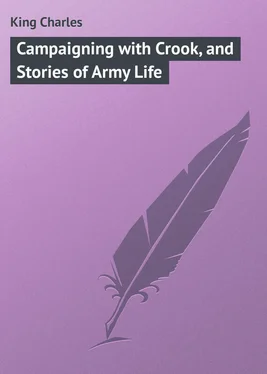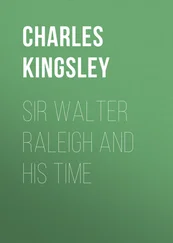Charles King - Campaigning with Crook, and Stories of Army Life
Здесь есть возможность читать онлайн «Charles King - Campaigning with Crook, and Stories of Army Life» — ознакомительный отрывок электронной книги совершенно бесплатно, а после прочтения отрывка купить полную версию. В некоторых случаях можно слушать аудио, скачать через торрент в формате fb2 и присутствует краткое содержание. Жанр: foreign_prose, на английском языке. Описание произведения, (предисловие) а так же отзывы посетителей доступны на портале библиотеки ЛибКат.
- Название:Campaigning with Crook, and Stories of Army Life
- Автор:
- Жанр:
- Год:неизвестен
- ISBN:нет данных
- Рейтинг книги:5 / 5. Голосов: 1
-
Избранное:Добавить в избранное
- Отзывы:
-
Ваша оценка:
- 100
- 1
- 2
- 3
- 4
- 5
Campaigning with Crook, and Stories of Army Life: краткое содержание, описание и аннотация
Предлагаем к чтению аннотацию, описание, краткое содержание или предисловие (зависит от того, что написал сам автор книги «Campaigning with Crook, and Stories of Army Life»). Если вы не нашли необходимую информацию о книге — напишите в комментариях, мы постараемся отыскать её.
Campaigning with Crook, and Stories of Army Life — читать онлайн ознакомительный отрывок
Ниже представлен текст книги, разбитый по страницам. Система сохранения места последней прочитанной страницы, позволяет с удобством читать онлайн бесплатно книгу «Campaigning with Crook, and Stories of Army Life», без необходимости каждый раз заново искать на чём Вы остановились. Поставьте закладку, и сможете в любой момент перейти на страницу, на которой закончили чтение.
Интервал:
Закладка:
All the morning the reservation Indians had come in flocks to have a look at the soldiers who had outwitted them on the previous day. Arrapahoe and Ogalalla, Minneconjou and Uncapapa, represented by dozens of old chiefs and groups of curious and laughing squaws, hung about us for hours – occasionally asking questions and invariably professing a readiness to accept any trifle we might feel disposed to part with. To beg is the one thing of which an Indian is never ashamed. In Arizona I have known a lot of Apaches to hang around camp for an entire day, and when they had coaxed us out of our last plug of tobacco, our only remaining match, and our old clothes, instead of going home satisfied they would turn to with reviving energy and beg for the things of all others for which they had not the faintest use – soap and writing-paper.
In addition to all the "squaw men" and "blanket Indians" at the reservation, there came to see us that day quite a number of Cheyennes, our antagonists of the day before. Shrouded in their dark-blue blankets and washed clean of their lurid war-paint, they were by no means imposing. One and all they wanted to see Buffalo Bill, and wherever he moved they followed him with awe-filled eyes. He wore the same dress in which he had burst upon them in yesterday's fight, a Mexican costume of black velvet, slashed with scarlet and trimmed with silver buttons and lace – one of his theatrical garbs, in which he had done much execution before the footlights in the States, and which now became of intensified value. Bill had carefully preserved the beautiful war bonnet, shield and decorations, as well as the arms of the young chieftain Yellow Hand, whom he had slain in single combat, and that winter ('76 and '77) was probably the most profitable of his theatrical career. The incidents of the fight of the 17th and the death of Yellow Hand were dramatized for him, and presented one of the most telling of the plays in which he starred all over the East that season. He realized above all expenses some $13,000 on that one alone, and I fancy that some of your readers may have seen it. For a time it was his custom to display the trophies of that fight in some prominent show-window during the day, and take them away only in time for the performance at night. As an advertisement it drew largely in the West, but when Bill reached the refinements of the Middle States and the culture of New England he encountered a storm of abuse from the press and the clergy which, while it induced him to withdraw "the blood-stained trophies of his murderous and cowardly deeds" from the show-windows, so stimulated public curiosity as to materially augment his receipts.
It is in New England, the land of the Pequots and the Iroquois, that the most violent partisans of the peace policy are to be found to-day. There is method in their cultured mania, for the farther removed the citizen finds himself from the Indian the better he likes him. Year after year, with the westward march of civilization, the Indian has found himself, in the poetic and allegorical language ascribed to him by Cooper and others who never heard him use it, "thrust farther towards the fiery bosom of the setting sun." Each state in turn has elbowed him on towards the Mississippi, and by the time the struggling aborigine was at the safe distance of two or three states away, was virtuously ready to preach fierce denunciation of the people who simply did as it had done. It is comical to-day to hear Mr. Conger, of Michigan, assailing Mr. Belford, of Colorado, because the latter considers it time for the Utes to move or become amenable to the laws of the land; and when we look back and remember how the whole movement was inaugurated by the Pilgrim Fathers, is it not edifying to read the Bostonian tirades against the settlers – the pilgrims and pioneers of the Far West?
Our march to Laramie was without noteworthy incident. We reached the North Platte on Friday afternoon, July 21, spent Saturday in busy preparation, and early Sunday morning, six o'clock, the trumpets were sounding "the General," the universal army signal to strike your tent and march away. The white canvas was folded into the wagons, and in a few moments more the column of horse was moving off on the long-anticipated march to join General Crook. Captain Egan and Lieutenant Allison of the Second Cavalry rode out from Laramie to wish us godspeed. By eight the sun was scorching our backs and great clouds of dust were rising under our horses' feet, and Laramie was left behind. Many and many a weary march, many a week of privation and suffering, many a stirring scene were we to encounter before once again the hospitable old frontier fort would open its gates to receive us. At half-past two we camped along the Platte at Bull Bend, and had a refreshing bath in its rapid waters; at four a violent storm of wind and rain bore down upon us, and beat upon our canvas during the night, but morning broke all the better for marching. A cold drizzle is far preferable to thick dust. We sped along briskly to the "La Bonté," and from there hastened on to Fetterman, where the main command arrived at noon on the 25th, the wagons and rear guard, of which I was in charge, coming in two hours later, fording the Platte at once, and moving into camp some distance up stream.
Fetterman was crowded with wagon trains, new horses, recruits, and officers, all waiting to go forward to General Crook, north of the Big Horn, and with the eight companies of the Fifth Cavalry as a nucleus, General Merritt organized the array of "unattached" into a disciplined force, brought chaos into prompt subjection, and at eight a.m. on the 26th started the whole mass on its northward march. Among those to meet us here were our old Arizona comrades, Lieutenants Rodgers and Eaton, who had hurried from detached service to catch us, and there were some comical features in the reunion. They had escaped from Eastern cities but the week previous, had made the journey by rail to Cheyenne and Medicine Bow, and by stage or ambulance to Fetterman, were fresh and trim and neat as though stepping out for parade. We had been marching and scouting for six weeks through scorching dust and alkali, and with untrimmed beards and begrimed attire were unrecognizable. Rodgers positively refused to believe in the identity of a comrade whom he had met at a german at Fort Hays, but forgot his scruples when he received through that same officer the notification that he was promoted to the command of Company "A," its captain having suddenly concluded to resign a short time before.
Here, too, the future medical director of the expedition, Dr. Clements, made his appearance, and joined for the campaign, and two officers of the Fourth Infantry, whose companies were not included in General Crook's field force, obtained authority to serve with the Fifth Cavalry. And among those who cast their lot with us as volunteers, there came a gallant sailor, a lieutenant of our navy, who, having leave of absence from his department after long sea service, came out to spend a portion thereof in hunting on the Plains, just as his cousin, Lieutenant Rodgers, was hastening to join his regiment; and Jack Tar became a cavalry man, to serve for three months or the war, and it wasn't a week before Mr. Hunter had won the regard of every officer and man in the Fifth, and the brevet of "Commodore," by which title he was universally hailed throughout the long and dreary campaign that followed.
Two more companies of ours, "E" and "F," had been ordered to join us also, but we were in a hurry, and they followed by forced marches. On the night of the 28th we were encamped in pitchy darkness in a narrow valley at the head-waters of the North Fork of the Mina Pusa. I was aroused from sleep by the voice of Lieutenant Pardee, who was serving as an aide-de-camp to General Merritt, and, rolling out of my blankets, found the general and himself at our tent. They asked if we had heard the distant sound of cavalry trumpets. The general thought he had, and we all went out beyond the post of the sentinels upon the open prairie to listen. It was time for Captains Price and Payne to reach us with their companies, and the general thought that in the thick darkness they had lost the trail and were signalling in hopes of a reply, and so we pricked up our ears. The silence was as dense as the darkness; no sound came from the slumbering camp; no light from the smouldering fire; suddenly there floated through the night air, soft and clear, the faint notes of the cavalry trumpet sounding "Officer's Call;" another minute and it was answered by our chief trumpeter, and, guided by the calls, in half an hour our comrades had joined us, and ten companies of the Fifth Cavalry were camped together for the first time in years.
Читать дальшеИнтервал:
Закладка:
Похожие книги на «Campaigning with Crook, and Stories of Army Life»
Представляем Вашему вниманию похожие книги на «Campaigning with Crook, and Stories of Army Life» списком для выбора. Мы отобрали схожую по названию и смыслу литературу в надежде предоставить читателям больше вариантов отыскать новые, интересные, ещё непрочитанные произведения.
Обсуждение, отзывы о книге «Campaigning with Crook, and Stories of Army Life» и просто собственные мнения читателей. Оставьте ваши комментарии, напишите, что Вы думаете о произведении, его смысле или главных героях. Укажите что конкретно понравилось, а что нет, и почему Вы так считаете.












